
A group of Syrian refugees including a couple with four young children detained in Turkey say they were tricked into being deported from Greece last month without having their asylum claims processed.
In the first case of its kind since the start of the EU-Turkey migration pact, at least eight Syrians were allegedly sent back to Turkey in October despite lodging asylum claims in Greece.
The allegations weaken the legal basis for the EU-Turkey deal, which was reached in March on the assumption that all refugees arriving in Greece would have access to a fair asylum procedure.
According to documents shared by the applicants with the Guardian, the refugees were initially given the chance to apply for asylum after landing in Greece on 9 October.
But 11 days later, before their applications were fully processed, they say they were tricked by EU and Greek officials into returning to Turkey.
Instead, police told his family that they were being flown to the Greek mainland. “The policemen said leave your dinner, get your stuff, we will take you to a police station for the night and [then] tomorrow morning to Athens,” Haji Mohamad said by phone from a detention camp in southern Turkey called Düziçi.
After boarding a plane with officials from the Greek government and the EU border agency, Frontex, the Syrians say they were not provided with any further information. The first time they had any inkling that they were being deported against their will was on arrival at Adana, Turkey.
“When we arrived and saw the Turkish flag we were shocked,” said Haji Mohamad. “We trusted the police but they tricked us and I don’t have any idea why.”
For nearly a fortnight since, they have been detained in Düziçi. “We are in a very bad situation,” a second Syrian from a different family said by telephone from the camp. “The children are all very ill; the little ones have breathing problems. Please help us.”
In an emailed statement, the Greek government said it was examining the claims. A Frontex spokesperson confirmed that EU officials were onboard the flight, but said Frontex could not be blamed for any mistakes. “All return decisions are issued by the national authorities,” said the spokesperson. “Our role is to provide means of transport, trained escorts, translators and medical personnel.”
The UN refugee agency says it is concerned by the situation. Amnesty International fears the case could be part of a wider attempt to remove Syrians from Europe “at any cost”, in contravention of EU and international law.
The EU-Turkey deal, coupled with the closure of a humanitarian corridor through the Balkans, has seen migration flows to eastern Europe fall drastically since March. But Greek and European officials are worried that the numbers may surge again if too few refugees are deported back to Turkey.

A sharp increase in numbers of migrants arriving in Greece
Despite the refugee deal, the number of refugees and migrants fleeing Turkey to Greece has risen slightly in recent weeks, but humanitarian groups familiar with the situation say it is premature to call it a return to the days of last summer when thousands made the crossing every day.
Frontex said it was the “first noticeable monthly increase” since the EU-Turkey migrant deal came into effect.
According to data from UNHCR, the first week of September saw 1,052 refugees and migrants crossing into Greece, nearly double the number the week before. The month of August saw a total of 3,437 arrivals in Greece, the highest number since April when 3,650 arrived.
Reports suggest the bump in figures might signal the revival of the Eastern Mediterranean route, which saw close to a million land in Greece in 2015, and the imminent collapse of a deal between Turkey and the E.U. to stem the flow of the displaced.
But Lucy Carrigan, a regional officer for Greece with the International Refugee Council, told TIME it is “hard” to know if the increase is part of a larger trend, as the movement of people has been difficult to predict since the closure of borders on the Balkan route and the E.U.-Turkey deal. “While yes, there has been an increase … the numbers are relatively speaking quite small,” says Carrigan, who works on the Greek island of Lesbos. This time last year, 5,000 people were making the crossing every day.
The EU-Turkey deal is certainly facing hurdles following the failed coup in Turkey. It has successfully slowed the flow; since the deal formally came into effect in March, the numbers of migrants leaving Turkey’s shores for Greece dropped from around 27,000 arrivals in March, to a monthly average of around 2,000 between April and July. But sources in Greece say authorities there have struggled to return recent migrant arrivals to Turkey—under the terms of the deal— as Turkish officials in charge of returns were recalled following the coup attempt.
More than 850,000 migrants arrived on the Greek islands last year, many after risking their lives in unseaworthy boats and dinghies.
